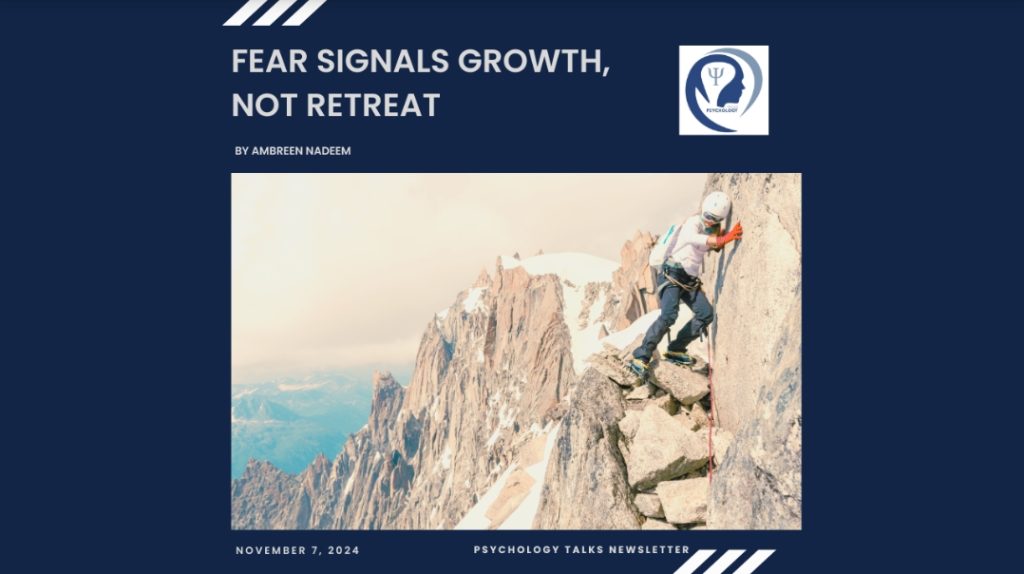Fear is a complex but essential part of the human experience. It’s our brain’s default way of protecting us, a mechanism honed over millennia to help you survive in uncertain and potentially dangerous situations. Whenever we step into unknown territory, your brain instinctively raises red flags, urging you to be cautious. But here’s the catch: these red flags aren’t meant to hold you back from growth or achievement. Rather, they’re reminders to be mindful and prepared.
Why Fear Isn’t Always a “Stop Sign”
We often misinterpret the feeling of fear. Instead of seeing it as a nudge to equip ourselves better, we mistake it for a signal to give up or retreat. This misinterpretation can prevent us from taking bold steps that could lead to great opportunities and personal growth. The key lies in learning to view fear as a call to prepare, rather than a reason to stop.

Sara Blakely, the founder of Spanx, is a great example of how she turned fear into motivation. Before launching her multimillion-dollar business, she faced numerous fears and setbacks. Blakely’s journey into entrepreneurship was filled with unknowns, and the fear of failure loomed large. She felt intimidated by the vastness of what she didn’t know, especially in a male-dominated industry. But instead of allowing fear to stop her, she took it as a cue to prepare. Blakely armed herself with as much knowledge as she could, even taking night classes to understand manufacturing and production. By viewing fear as a signal to learn and grow, she was able to navigate the unknown and turn her idea into a billion-dollar brand.

Blakely’s story reminds youthat fear isn’t an obstacle. It’s a guide, urging you to anticipate challenges and build resilience.
How to Face Fear Effectively
The question, then, is: how can we learn to face our fears without letting them paralyze us? Here are some strategies to help turn fear from a barrier into a powerful motivator:
1. Treat Fear as Signal for Preparation
When fear arises, it’s a signal that you might be entering unfamiliar territory, which means preparation is essential. Think of it as an invitation to equip yourself for the unknown. Imagine someone about to give a public speech for the first time. The jitters they feel—the sweaty palms, the racing heart—aren’t telling them to avoid the stage. Instead, they’re reminders to rehearse, refine their message, and anticipate possible questions.

For example, Denzel Washington, known for his powerful public speeches, shared that he still feels nervous before every major address. Instead of shying away, he practices relentlessly, turning his nervous energy into a performance that inspires millions.
2. Gather Knowledge and Build Skills
One of the most effective ways to combat fear is through knowledge. When you understand more about the challenges you’re facing, they tend to lose their power. The unknown becomes known, and what was once frightening starts to feel manageable.

Consider the story of Elon Musk and his journey with SpaceX. When he decided to build a private space company, he was venturing into a field dominated by industry giants and highly specialized knowledge. Musk didn’t have a background in aerospace engineering, but he was undeterred. Rather than letting fear of the unknown stop him, he devoured textbooks, consulted experts, and educated himself on rocket science. By equipping himself with knowledge, he turned his fear into a strategy, ultimately achieving milestones in private space travel.
3. Seek Support from Others Who Have Walked the Path
Sometimes, the best way to combat fear is to lean on the experiences of those who have been there before. Seek out mentors, coaches, or peers who have faced similar challenges and succeeded. Their advice, support, and encouragement can go a long way in helping you navigate your fears.

The journey of Oprah Winfrey, one of the most iconic media figures, is filled with such stories of mentorship and guidance. When she began her career, she encountered countless fears and obstacles, often feeling alone in a highly competitive industry. She sought out mentors like Maya Angelou, who provided wisdom and perspective. Through these relationships, Oprah learned how to face her fears, gaining the confidence to pursue ambitious goals and become one of the most influential women in the world.
Turning Fear into Fuel for Growth
It’s natural to experience fear in the face of the unknown, but remember, fear is only a part of the process, not the destination. When we reframe fear as a sign to prepare, grow, and seek support, it becomes an ally rather than an enemy.
The next time you feel fear creeping in, try this approach:
Acknowledge it: Don’t push it away. Recognize it as a natural part of your journey.
Investigate its source: What specific part of the situation is triggering your fear? Identifying this can help you understand what you need to prepare for.
Create an action plan: Decide what knowledge, skills, or resources you need to face this challenge. Take small, manageable steps to build your confidence.
As Montaigne wisely pointed out, “A man who fears suffering is already suffering what he fears.”
By fearing potential challenges, we trap ourselves in a cycle of anxiety and missed opportunities. Instead, let’s meet fear with curiosity and preparation. Let’s allow it to strengthen you for the journey, equipping you to step confidently into new chapters of our lives. After all, every great story begins with a moment of courage in the face of fear.

